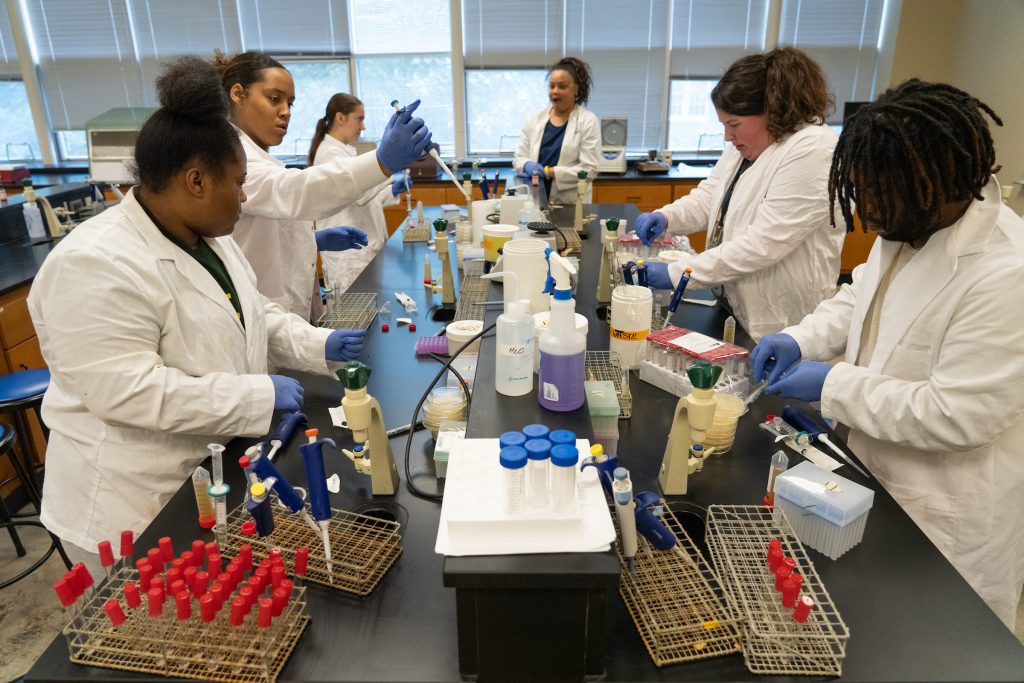New fall classes focus on research and discovery for first-year students
Mississippi University for Women’s Department of Sciences and Mathematics is being assisted by the Howard Hughes Medical Institute, one of the largest biomedical research foundations in the world, to bring research-driven instruction to first-year students.

“The biology and microbiology faculty here would love it if any student of any major interested in an exciting, research-based learning experience would take this course. We are very confident that students will learn as they go, regardless of how much science experience they have coming in. We think learning while actively hunting phage will both make the learning more fun and engaging, and make it stickier in what they remember about biology years from now,” said Dr. Ross Whitwam, professor of biology.
Starting in fall 2024 and open to all majors, the Department of Sciences and Mathematics is offering variations on their freshmen biology courses that have students hunting, isolating, purifying, analyzing and naming novel undiscovered bacterial viruses called bacteriophages.
According to Whitwam, bacteriophages, or simply phages, only infect bacteria and are harmless to humans, but they may represent the most abundant organisms on Earth, and the vast majority of them remain to be discovered, let alone studied. In the new course, the students will work to do both – discover and study – phages they pluck out of samples they will find in the greater Columbus area.
In the new, two-semester course sequence, simply titled Biology I and Biology II, the students will spend more time in the lab, doing cutting-edge molecular biology and microbiology research work, than in the classroom.
Dr. Davida Crossley, associate professor of microbiology and one of the instructors for the new courses, said, “This is such a great opportunity for students to not only learn the material but to actively see biology at work. This also allows for their scientific data to be published and distributed so that the world can see. I am thrilled and excited to be involved in this process, and can only imagine how this will open more doors in the field of science, for our students, for our university and for the world.”
The new courses were developed as part of an international program called SEA-PHAGES run by Dr. Graham Hatfull at the University of Pittsburgh and the Howard Hughes Medical Institute. The SEA-PHAGES program – an acronym for Science Education Alliance-Phage Hunters Advancing Genomics and Evolutionary Science – provides protocols for the phage lab work, provides DNA sequencing serves for the student projects and organizes conferences and symposia for the student researchers to present their work at.
More than 140 other schools besides The W are currently part of the SEA-PHAGES program and run similar courses.
The Ina E. Gordy Honors College is making the new phage-hunting biology courses part of their biology curriculum. Freshmen honor students, of multiple majors, have enrolled as a cohort in the courses in their first year.
“Biology I is a wonderful opportunity for our students, providing them with hands-on research experience. It is also a clear example of the university’s support for high-impact learning. Students have already praised the course, saying it helps them grasp the concepts they are discussing and makes the science classroom exciting.,” said Honors College Director Dr. Josh Dohmen. “
The Department of Sciences and Mathematics hopes to expand the sections in upcoming academic years. “This will be a great, fun, educational and memorable experience in not only biology, but how research is done in the real world,” said Dr. Whitwam. “We are thrilled to be getting the chance to offer it to our students.”